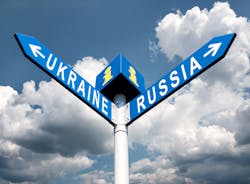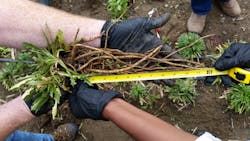So that Happened: Who’s Staying in Russia? Weed for Tires, STEM Challenges
Editor’s note: Welcome to So That Happened, our editors’ takes on things going on in the manufacturing world that deserve some extra attention. This will appear regularly in the Member’s Only section of the site.
Exiting Russia, or Just Biding Their Time?
The war in Ukraine rages on and atrocities proliferate, yet some U.S. manufacturers still continue to do business with Russia, according to research by Yale University’s Chief Executive Leadership Institute.
Since February, the team of 24 researchers, led by Professor Jeffrey Sonnenfeld, has been tracking the Russian business dealings of over 1,000 of the world’s largest brands. When the findings were first published the week of Feb. 28, only several dozen companies had pulled their business and operations from Russia. As of April 19, more than 750 had to some degree.
Originally, the Yale team—consisting of experts in a cross-section of financial and governance areas and fluent in 10 languages including Ukrainian and Russian—categorized companies as either “withdraw” or “remain.” But in the weeks that followed, they started assigning A through F letter grades for each company based on the completeness of withdrawal.
The U.S.-based manufacturers receiving an ‘A’ Grade as of April 19, having fully exited or suspended their operations in Russia, are:
Alcoa, Authentic Brands/Reebok, Avery Dennison, Ball Corp., Bose, Brown-Forman (spirits), Cummins, Exxon, FMC Corp. (chemicals), Global Foundries, Grainpro (agricultural storage), Jabil, Lincoln Electric, Monroe Energy, Par Pacific, Parker Hannifin, Sonos (audio products), Stanley Black & Decker, Waters Corp. (analytical laboratory instruments).
The U.S. based manufacturing companies receiving an ‘F’ grade (Defying Demands for Exit or Reduction of Activities) are:
- Owens Corning (insulation, roofing and fiberglass)
- Paccar (truck manufacturer)
- Tenneco (automotive supplier)
- Titan International (tiremaker for off-road and farming vehicles)
Sources for the dataset include government regulatory filings, tax documents, company statements, financial analyst reports and business intelligence and media from 166 countries, as well as “a global wiki-style network of 150+ company insiders, whistleblowers and executive contacts.”
On April 19, IndustryWeek contacted media spokespeople for all four “F” manufacturers via email. Paccar and Tenneco responded.
Paccar’s Ken Hasting, head of investor relations, said of the F grade, “That is factually incorrect. We stopped all operations in Russia when sanctions were announced at the beginning of the war.”
Yale’s Sonnenfeld responded that Paccar continues to list four distributors on its active Russian sales page and those distributors, when contacted by the Yale research team, confirmed “they were still operational and selling [Paccar’s] products.”
Tenneco’s Mike Alzamora, director of global communications, said that Tenneco actually deserved a “B,” the grade for “temporarily curtailing most or nearly all operations while keeping return options open”. When the “Ukraine conflict” began, he stated, “Tenneco immediately suspended all cross-border shipments with Russia and Belarus—meaning we had no raw materials, components or finished products going in or out of either country.” He said that of Tenneco’s four plants in Russia, “two are idled, and in the other two, we have ceded control to local management, ceased all communications with them and have no current information on their status.”
Steven Tian, one of the Yale researchers, replied that if Tenneco has ceased operating in Russia, they should issue an official statement via their website or through a regulatory filing “as 750 peers have done without issue—making clear their position on Russia.”
Owens Corning issued a statement that the company is “shocked and saddened” by the situation in Ukraine and is “pursuing options to transfer or sell our Russian facilities and exit Russia.” The company plans to continue to operate two facilities in Russia “until the transfer or sale is complete, while remaining committed to the safety and security of our employees in the country.”
Yale’s Tian said committing to exit at some future, yet-to-be-named date isn’t enough. “Owens Corning, like some others on the list, are disappointingly prolonging extensive, ambiguous ‘pursuits of options’ to exit.” He added that experts in the region consider a sale of the plants “a pipe dream.”
Create It and They Will Come – P&G Hosts STEM Challenge with HER Campus Labs
Trying to find women entrepreneurs isn’t easy.
So, P&G Ventures joined with Her Campus Media, whose audience is college students and Gen Z, to host Her Campus Labs Next in STEM Challenge. P&G Ventures is an in-house studio that creating new brands and businesses in partnership with entrepreneurs, inventors and startups.
“As we search for entrepreneurs who might have the next great consumer product, we are confident that this program with Her Campus Media will help us to put a special focus on female innovators–a group that’s underrepresented in the broader ecosystem,” said Betsy Bluestone, Senior Director of Scouting and Partnerships for P&G Ventures, in a statement.
P&G says that it has seen how hard it is for women who want to in launch a new product or technology. While women make up 60% of current college undergraduates, only 15% are in engineering majors. Then when they do try and fund businesses less than 2% are able to secure venture capital funding.
As part of the challenge innovators who are nominated from their schools will have the opportunity to pitch their product, or innovation, directly to P&G Ventures executives.
Bionic Kids
Did you know that many insurance programs don’t cover prosthetic arms for children? Legs are vital for mobility, arms… not so much. And, children who do get mechanical limbs typically go through several as they grow bigger and taller, repeating that expensive process
IndustryWeek partner publication Plastics Machinery & Manufacturing recently detailed the efforts of a non-profit organization—Limbitless Solutions (I’m a sucker for a good pun)—that 3D prints arms for children and works with artists to decorate them, drawing attention to these marvels of manufacturing and design.
Read more about this organization and how they print parts that allow accident and disease victims live more normal lives throughout their childhoods.
Dandelions: Weeds or Tire Materials?
More than a decade into a project to turn garden weeds into rubber, Goodyear Tire & Rubber Co. announced plans to work with the Department of Defense, the Air Force Research Lab, BioMADE and Farmed Materials to speed commercialization of the rubber tree replacement strategy.
The latest program will build on research that analyzed more than 2,500 species of plants but found only a few with properties suitable for use in tires. Taraxacum kok-saghyz, a species of dandelion known as TK, has proven to be a valuable alternative to natural rubber trees.
“Global demand for natural rubber continues to grow, and it remains a key raw material for the tire industry,” said Chris Helsel, senior vice president Global Operations and Chief Technology Officer for Goodyear. “This is a critical time to develop a domestic source of natural rubber, which may help mitigate future supply chain challenges.”
Dandelions could be a valuable source for several reasons. They’re domestic, and as any gardener or lawn owner can tell you, they’re annoyingly hardy and fast growing. It takes seven years for a rubber tree to get big enough to start harvesting its sap. Dandelions can be harvested every six months (unfortunately for home owners, this means a commercial grow operation, not a project in which Goodyear employees will come and weed your lawn to harvest materials).
Backed by the DoD, the collaboration of Goodyear, BioMADE and Farmed Materials will accelerate commercialization of TK, beginning in the spring of 2022 with the planting and harvesting of TK seeds in Ohio. The natural rubber produced will be used in the production of military aircraft tires that will be built and tested under rigorous applications by Goodyear in cooperation with the AFRL at Wright-Patterson Air Force Base in Dayton, Ohio.

